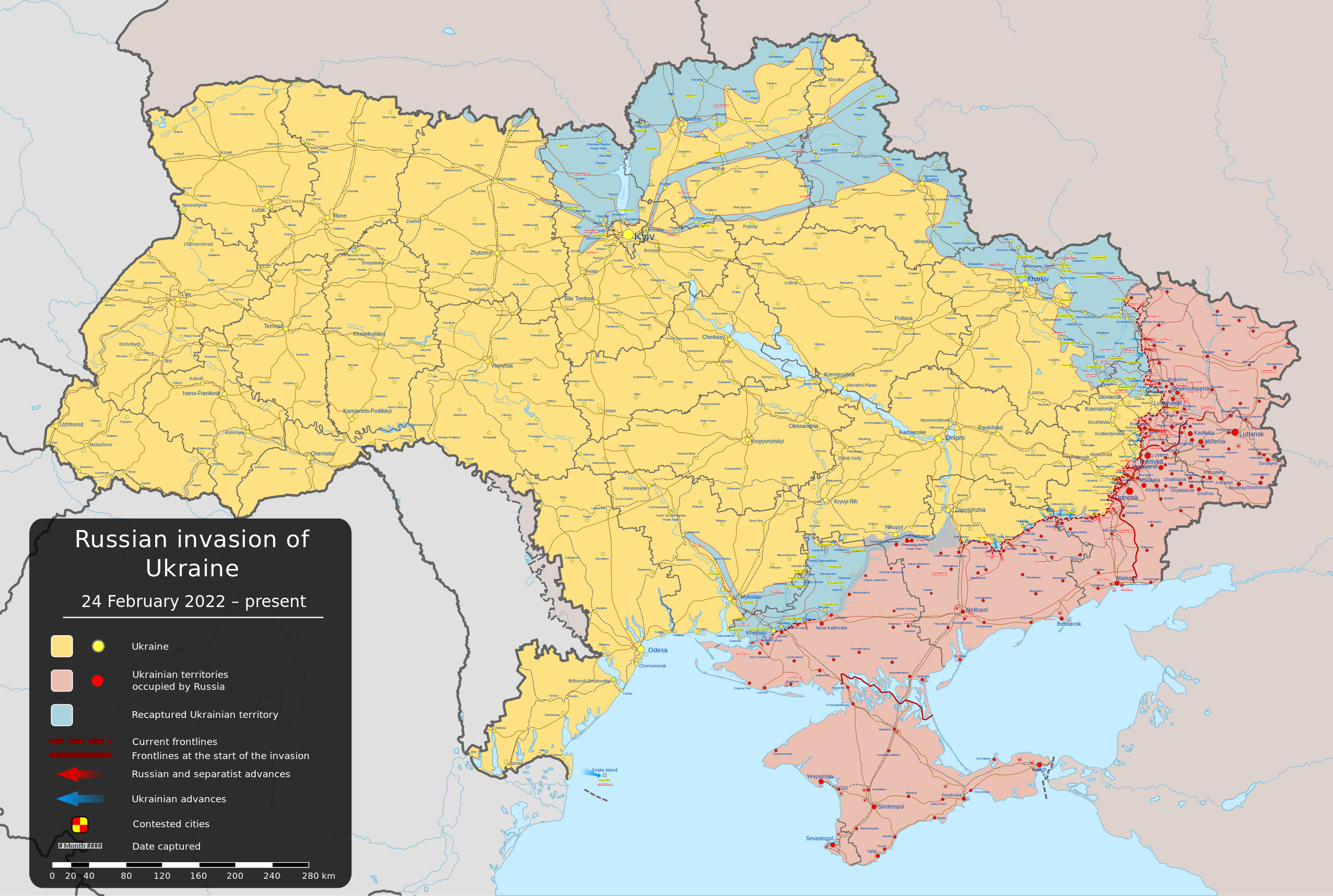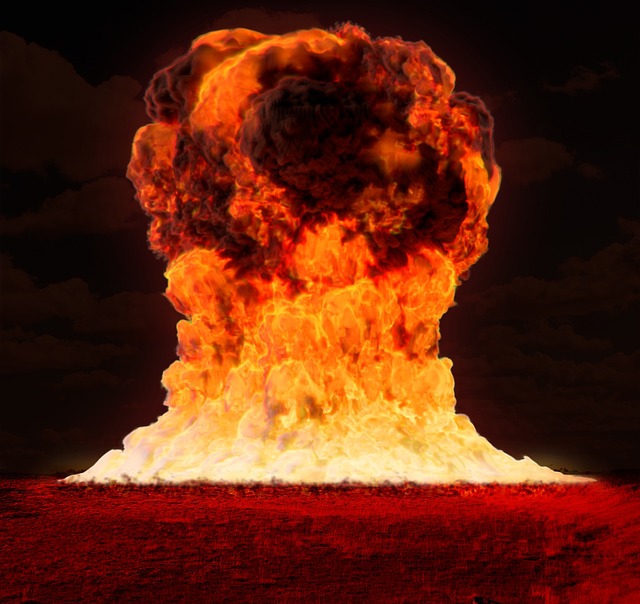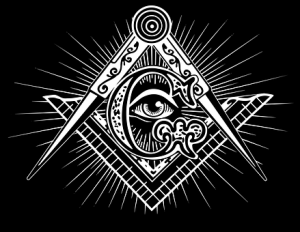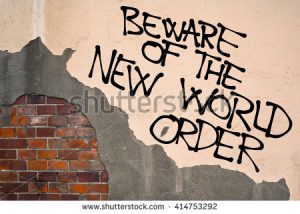WSWS: New York Times report demolishes the narrative of the “unprovoked war” in Ukraine
Monday, February 26th, 2024
Map from as of 24 February 2024
For years, I warned about what was going on between Russia and Ukraine (e.g. from 2013: Ukrainian President Objects to Western Interference and Embraces Aid from Russia).
Back in 2014, I reported that after Ukraine’s democratically-elected president was ousted, the USA did not want Ukraine split, irrespective of the will of those in Eastern Ukraine (see Thiel B. Ukraine appoints interim president–what will Russia’s Putin do? COGwriter, February 2014).
Back in 2015 I posted:
Russia’ President Vladimir Putin has repeatedly decried the loss of the Soviet Union as a major disaster, put together the Eurasian Union, and has repeatedly made it clear he feels that Ukraine should be more attached to Russia than the European Union. …
Despite high hopes of many of the protesters in the west of Ukraine, Ukraine has not fared well since the Euromaidan protests. Crimea voted to leave Ukraine and was annexed by Russia. Separatists in eastern Ukraine would like to do the same. Thousands of Ukrainians have been killed in military action since ‘EuroMaidan.’
Russia considered the protests an illegal coup that was flamed by the West to reduce Russian influence with Ukraine. Russia has taken many steps since EuroMaidan to try to gain influence in and with Ukraine. At this moment, Russia hopes for either a split in which it ends up with parts of eastern Ukraine or that the Ukrainians will get so disappointed with how matters have turned out that they will welcome Russia. Since the Europeans are supplying money to Kiev and most Ukrainians in the west of Ukraine do not care Russia’s encouragement of the separatists, that latter item will not happen for a time.
Biblically, ‘the kings of the Medes,’ which includes Russia and at least parts of Ukraine will unite against Europe (Jeremiah 51:11, 28-29). (Thiel B. UK and Europe ‘badly misread Russia,’ ‘EuroMaidan’ anniversary. COGwriter, February 20, 2015)
In 2022, several weeks before Russia began its ‘special military operation’ into Ukraine, I posted the following:
There are major tensions in Europe related to troop build-ups and rhetoric related to Russia and Ukraine.
Could there be any prophetic ramifications?
Yes.
But first some background.
We have seen economic, religious, and military concerns particularly over the past 9-10 years.
In 2013, The government of Ukrainian President Viktor Yanukovych had decided to suspend the Ukraine–European Union Association Agreement and seek closer economic ties with Russia. Then were was a several-months-long wave of demonstrations and protests known as the Euromaidan, which later escalated into the Revolution of Dignity that led to the overthrow of Yanukovych and the establishment of a new government. It took steps like no longer considering Russian an official language, even though that was the predominant language in eastern Ukraine.
This led to issues in the east in regions such as Donbass and Crimea which supported stronger ties with Russia.
In 2014, Russia sent troops to Crimea where it had a naval base. Later the electorate there voted to become part of Russia, and Russia accepted Crimea. The West has been upset about that for some time.
So were many in Ukraine. In 2018 the Ukrainian Orthodox petitioned the Patriarch of Constantinople to be separate from and no longer under the authority of the Russian Orthodox Church. That was granted in 2019. …
So, there may be some type of split involving Ukraine.
You’ve got people in Western Ukraine who want to be part of the European Union, and you’ve got people on the Eastern side who have economic ties to Russia, often speak Russian, and see Russia as a more reliable partner than the EU, the Russians pay more attention to us, the Russians supply oil to us, etc. So, yes, there are modern reasons why we may see more of a split with Ukraine.
Back in 2013 I said I believed at least some of the Ukrainian territory would be under Russian control, and that happened with Crimea the next year. …
That being said, right now, people in Ukraine are frightened. They worry about war, government, poverty, freedom, and economic matters.
Those affected by wars and rumors of wars in that region should be in our prayers.
The Bible shows war is in the future for Russia and Ukraine, (Thiel B. Wars and Rumors of War: What about Russia and Ukraine? COGwriter, February 5, 2022)
We also put out a video before the ‘special military operation’: Russia, Ukraine, Babylonian Europe, and Prophecy.
Why bring this up now?
Well, for one reason, many leaders in the West have repeatedly stated that Russia’s ‘Special Military Operation’ into Ukraine was “unprovoked” or “totally unprovoked.”
While I do not believe Russia should have done its ‘Special Military Operation’ as it has done it, between the West backing the overthrow of Ukraine’s democratically elected president Viktor Yanukovich in 2014, Crimea voting that year to be part of Russia, Western sanctions since 2014 for Russia to give up Crimea, issues in the Donbas where many there pleaded for Russian military intervention, the West breaking its promises to not have Eastern European nations joining NATO, the Ukrainian government’s push to separate the Ukrainian Orthodox Church from the Russian Orthodox Church, and President Putin’s pleas in early 2022 to not allow Ukraine into NATO (which were rebuffed by the USA), one might consider that at least some of those were provocations.
Furthermore, notice also the following:
New York Times report demolishes the narrative of the “unprovoked war” in Ukraine
February 26, 2024
For the past two years, nearly every reference in the US media to the February 2022 invasion of Ukraine by Russia has been preceded by an obligatory word—“unprovoked.”
The public was told that this was a war without cause, that Ukraine was blameless, and that the invasion was to be explained entirely in terms of the intentions and psychology of one man, Russian President Vladimir Putin.
However, on the weekend of the second anniversary of the war, the New York Times published a lengthy article revealing that the Russian invasion of Ukraine on February 24, 2022 was instigated by a systematic and widespread campaign of military-intelligence aggression on the part of the United States.
The article details longstanding Central Intelligence Agency (CIA) operations in Ukraine, in which the agency sponsored and built up the Ukrainian military intelligence agency HUR, using it as a weapon of spying, assassination and provocation directed against Russia for more than a decade.
The Times writes:
Toward the end of 2021, according to a senior European official, Mr. Putin was weighing whether to launch his full-scale invasion when he met with the head of one of Russia’s main spy services, who told him that the C.I.A., together with Britain’s MI6, were controlling Ukraine and turning it into a beachhead for operations against Moscow.
The Times report demonstrates that this Russian intelligence assessment was absolutely true. For more than a decade, dating back to 2014, the CIA was building up, training and arming Ukrainian intelligence and paramilitary forces that were engaging in assassinations and other provocations against pro-Russian forces in eastern Ukraine, against Russian forces in Crimea and across the border into Russia itself.
In a critical passage, the Times writes:
As the partnership deepened after 2016, the Ukrainians became impatient with what they considered Washington’s undue caution, and began staging assassinations and other lethal operations, which violated the terms the White House thought the Ukrainians had agreed to. Infuriated, officials in Washington threatened to cut off support, but they never did.
In other words, Ukrainian paramilitary forces that were armed, funded and led by the United States and NATO were systematically assassinating forces supporting closer relations with Russia.
The newspaper’s account begins with the Maidan Coup of February 2014, when right-wing and neo-Nazi forces backed by the US and the European Union overthrew the elected pro-Russian president and installed a pro-imperialist regime headed by the billionaire Petro Poroshenko. …
The Times reports that a Ukrainian unit, the Fifth Directorate, was tasked with conducting assassinations, including one in 2016. The Times writes:
[A] mysterious explosion in the Russian-occupied city of Donetsk, in eastern Ukraine, ripped through an elevator carrying a senior Russian separatist commander named Arsen Pavlov, known by his nom de guerre, Motorola.
The C.I.A. soon learned that the assassins were members of the Fifth Directorate, the spy group that received C.I.A. training. Ukraine’s domestic intelligence agency had even handed out commemorative patches to those involved, each one stitched with the word “Lift,” the British term for an elevator.
The report describes another such operation:
A team of Ukrainian agents set up an unmanned, shoulder-fired rocket launcher in a building in the occupied territories. It was directly across from the office of a rebel commander named Mikhail Tolstykh, better known as Givi. Using a remote trigger, they fired the launcher as soon as Givi entered his office, killing him, according to U.S. and Ukrainian officials.
Since the outbreak of full-scale war, the Ukrainian HUR has extended these assassination operations to the whole territory of Russia, including the killing of Darya Dugina, a leading pro-Putin polemicist in the Russian media, and Russian government and military officials. …
The Times account also provides an inadvertent indictment of the American media. The newspaper writes:
The details of this intelligence partnership, many of which are being disclosed by the New York Times for the first time, have been a closely guarded secret for a decade.
This admission means that these secrets were “closely guarded” by the Times itself. As former Editor Bill Keller once observed, freedom of the press means freedom not to publish, and “that is a freedom we exercise with some regularity.” Particularly, we might add, when it comes to the crimes of US imperialism. https://www.wsws.org/en/articles/2024/02/26/nrdz-f26.html
Here is something directly from the New York Times:
February 25, 2024
Now entering the third year of a war that has claimed hundreds of thousands of lives, the intelligence partnership between Washington and Kyiv is a linchpin of Ukraine’s ability to defend itself. The C.I.A. and other American intelligence agencies provide intelligence for targeted missile strikes, track Russian troop movements and help support spy networks.
But the partnership is no wartime creation, nor is Ukraine the only beneficiary.
It took root a decade ago, coming together in fits and starts under three very different U.S. presidents, pushed forward by key individuals who often took daring risks. It has transformed Ukraine, whose intelligence agencies were long seen as thoroughly compromised by Russia, into one of Washington’s most important intelligence partners against the Kremlin today.
The listening post in the Ukrainian forest is part of a C.I.A.-supported network of spy bases constructed in the past eight years that includes 12 secret locations along the Russian border. …
Around 2016, the C.I.A. began training an elite Ukrainian commando force — known as Unit 2245 — which captured Russian drones and communications gear so that C.I.A. technicians could reverse-engineer them and crack Moscow’s encryption systems. (One officer in the unit was Kyrylo Budanov, now the general leading Ukraine’s military intelligence.)
And the C.I.A. also helped train a new generation of Ukrainian spies who operated inside Russia, across Europe, and in Cuba and other places where the Russians have a large presence.
The relationship is so ingrained that C.I.A. officers remained at a remote location in western Ukraine when the Biden administration evacuated U.S. personnel in the weeks before Russia invaded in February 2022. During the invasion, the officers relayed critical intelligence, including where Russia was planning strikes and which weapons systems they would use.
“Without them, there would have been no way for us to resist the Russians, or to beat them,” said Ivan Bakanov, who was then head of Ukraine’s domestic intelligence agency, the S.B.U. …
Mr. Putin has long blamed Western intelligence agencies for manipulating Kyiv and sowing anti-Russia sentiment in Ukraine.
Toward the end of 2021, according to a senior European official, Mr. Putin was weighing whether to launch his full-scale invasion when he met with the head of one of Russia’s main spy services, who told him that the C.I.A., together with Britain’s MI6, were controlling Ukraine and turning it into a beachhead for operations against Moscow. …
The C.I.A.’s partnership in Ukraine can be traced back to two phone calls on the night of Feb. 24, 2014, eight years to the day before Russia’s full-scale invasion. … The government’s new spy chief, Valentyn Nalyvaichenko, arrived at the headquarters of the domestic intelligence agency and found a pile of smoldering documents in the courtyard. …
The situation quickly became more dangerous. Mr. Putin seized Crimea. His agents fomented separatist rebellions that would become a war in the country’s east. Ukraine was on war footing, and Mr. Nalyvaichenko appealed to the C.I.A. for overhead imagery and other intelligence to help defend its territory. …
One day after General Kondratiuk was removed, a mysterious explosion in the Russian-occupied city of Donetsk, in eastern Ukraine, ripped through an elevator carrying a senior Russian separatist commander named Arsen Pavlov, known by his nom de guerre, Motorola.
The C.I.A. soon learned that the assassins were members of the Fifth Directorate, the spy group that received C.I.A. training. Ukraine’s domestic intelligence agency had even handed out commemorative patches to those involved, each one stitched with the word “Lift,” the British term for an elevator. https://www.nytimes.com/2024/02/25/world/europe/cia-ukraine-intelligence-russia-war.html
ZeroHedge posted some comments related to this:
February 26, 2024
On Sunday The New York Times published an explosive and very belated full admission that US intelligence has not only been instrumental in Ukraine wartime decision-making, but has established and financed high tech command-and-control spy centers, and was doing so long prior to the Feb. 24 Russian invasion of two years ago.
Among the biggest revelations is that the program was established a decade ago and spans three different American presidents. The Times says the CIA program to modernize Ukraine’s intelligence services has “transformed” the former Soviet state and its capabilities into “Washington’s most important intelligence partners against the Kremlin today.”
This has included the agency having secretly trained and equipped Ukrainian intelligence officers spanning back to just after the 2014 Maidan coup events, as well constructing a network of 12 secret bases along the Russian border—work which began eight years ago. These intelligence bases, from which Russian commanders’ communications can be swept up and Russian spy satellites monitored, are being used launch and track cross-border drone and missile attacks on Russian territory.
This means that with the disclosure of the longtime “closely guarded secret” the world just got a big step closer to WW3, given it means the CIA is largely responsible for the effectiveness of the recent spate of attacks which have included direct drone hits on key oil refineries and energy infrastructure.
“Without them [the CIA and elite commandoes it’s trained], there would have been no way for us to resist the Russians, or to beat them,” according to Ivan Bakanov, former head of the SBU, which is Ukraine’s domestic intelligence agency.
A main source of the NYT revelations—disclosures which might come as no surprise to those never willing to so easily swallow the mainstream ‘official’ narrative of events—is identified as a top intelligence commander named Gen. Serhii Dvoretskiy.
Clearly, Kiev and Washington now want world to know of the deep intelligence relationship they tried to conceal for over the past decade. It is perhaps a kind of warning to Moscow at a moment Ukraine’s forces are in retreat: the US is fighting hand in glove with the Ukrainians. And yet the revelations contained in the NY Times report also confirm what President Putin has precisely accused Washington of all along. https://www.zerohedge.com/geopolitical/cia-built-12-secret-spy-bases-ukraine-waged-shadow-war-last-decade-bombshell-nyt
While what happened was not World War 3, Russia’s ‘Special Military Operation’ into Ukraine has certainly made the Europeans increase their military spending.
Since Europe will be the military power to basically launch the starting attacks in WWIII, that has brought WWIII closer.
Furthermore, the Ukrainians have been relying on the USA.
The New York Times piece helps show how long that has been going on.
And when the Europeans see that Ukraine is not getting all the support from the USA that it hopes, the Europeans will further consider that they need to rearm and plan to defend themselves without the current need to rely on the USA.
Earlier in 2022, a couple of weeks prior to Russia’s ‘special military operation’ into Ukraine, the Continuing Church of God (CCOG) put out the following video on our Bible News Prophecy YouTube channel:
The situation between Russia and Ukraine has again heated up, although it has been tense since the Euromaiden protests and Russia’s annexation of Crimea. There was later a separation of the Ukrainian Orthodox Church from the Russian Orthodox Church. Is war prophesied for Russia and Ukraine? Are prophecies in the Bible associated with the ‘kings of the Medes’ and a power from the “north country” related to any in Russia and Ukraine? Is a confederation of powers from the north, east, and central Asia prophesied to destroy the coming end time European Babylon? Will the destruction be reminiscent of what happened to Sodom and Gomorrah? How is the King of the North and who will destroy him? Do those in Russia and Ukraine have a hope of salvation? Will Russia and powers of the east be involved in the gathering in Armageddon as prophesied in Revelation 16? Dr. Thiel addresses these issues.
Here is a link to our video: Russia, Ukraine, Babylonian Europe, and Prophecy.
Since that video came out more territory, once controlled by Ukraine, is part of Russia.
And, now the world sees that the USA was more involved in provoking Russia than it wanted the world to know.
Some items of possibly related interest may include:
World War III: Steps in Progress Are there surprising actions going on now that are leading to WWIII? Might a nuclear attack be expected? Does the Bible promise protection to all or only some Christians? How can you be part of those that will be protected? A related video would be Is World War III About to Begin? Can You Escape?
Russia and Ukraine: Their Origins and Prophesied Future Russia in prophecy. Where do the Russians come from? What about those in the Ukraine? What is prophesied for Russia and its allies? What will they do to the Europeans that supported the Beast in the end? There is also a video sermon available: Russia in the Bible and in Prophecy as are two video sermonettes Russia, Ukraine, Babylonian Europe, and Prophecy and Ukraine in Prophecy?
Is Russia the King of the North? Some claim it is. But what does the Bible teach? Here is a link to a video, also titled Is Russia the King of the North?
Ezekiel 38: For Russia & Iran in Our Day? Is Ezekiel 38 about to be fulfilled? Are we close to the battle with Gog and Magog? Four related videos are available: Ezekiel 38 Gog and Magog War: Is it Soon?, Ezekiel 38: For Russia, Ukraine, & Iran Now?, Russia, Iran, Syria, & the Bible (Code), and Gog, Magog, Vladimir Putin, and Ezekiel 38?
Lost Tribes and Prophecies: What will happen to Australia, the British Isles, Canada, Europe, New Zealand and the United States of America? Where did those people come from? Can you totally rely on DNA? Do you really know what will happen to Europe and the English-speaking peoples? What about the peoples of Africa, Asia, South America, and the islands? This free online book provides scriptural, scientific, historical references, and commentary to address those matters. Here are links to related sermons: Lost tribes, the Bible, and DNA; Lost tribes, prophecies, and identifications; 11 Tribes, 144,000, and Multitudes; Israel, Jeremiah, Tea Tephi, and British Royalty; Gentile European Beast; Royal Succession, Samaria, and Prophecies; Asia, Islands, Latin America, Africa, and Armageddon; When Will the End of the Age Come?; Rise of the Prophesied King of the North; Christian Persecution from the Beast; WWIII and the Coming New World Order; and Woes, WWIV, and the Good News of the Kingdom of God.




















